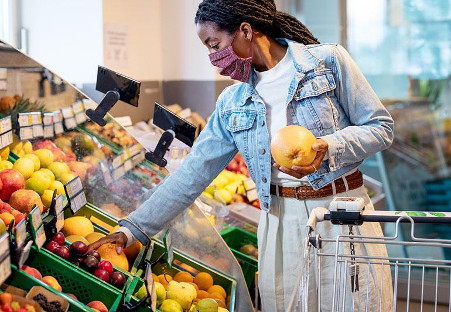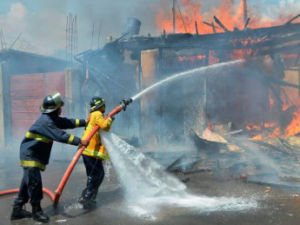Skyrocketing food costs, global instability threaten nations
The costs of several basic food items, meats, and ground provisions have doubled, in some cases, over the last three years, pushing some families close to starvation as they struggle to meet basic food bills.
A comparison of the survey of grocery items prepared by the Consumer Affairs Commission (CAC) indicates that the prices of items such as hard dough bread, flour, sugar, chicken back, infant formula, saltfish, corned beef, whole chicken, and powdered milk have seen massive increases since 2021. A National Giant Hardo Bread, for example, which was being sold for $345 in January 2021, costs $525 when checks were carried out by the CAC team between February 7-8, 2024. A Best Dressed whole chicken (1 kg), which was being sold for $539 at the same time in 2021, is now being sold for as much as $914, while a tin of corned beef, which was $363 then, is now being sold for as much as $571. A pack of pre-packaged dark sugar, which was $246, is now being sold for more than $400 for the same amount, while a tin of 400-gram infant formula, which was sold for on average $760, is now above $1000. Dry salted fish, a key ingredient in Jamaica’s national dish, has moved from less than $1200 per kg to more than $1800 at several supermarkets.
Householders have been complaining about the high cost of living, despite declarations from the ruling Jamaica Labour Party that Jamaica has been the beneficiary of good economic management and fiscal prudence since the COVID-19 pandemic. Several political analysts have since expressed the view that the benefits have not been trickling down to the average Jamaican.
As the government recovers from a razor-thin victory in the February 26 local government elections and prepares for the budget debate in the coming days, it is to be seen whether there will be the usual showing of the grocery basket, which has been a staple in these debates as proof that government policies are yielding benefits for consumers.
According to the Jamaica Survey of Living Conditions 2021, approximately 42.6 percent of households felt that their economic situation was worse off in 2021 than during the height of the pandemic in 2020.
“Regarding food security, compared with 2019, a smaller proportion of households (52.3 percent) felt that they had enough food to eat on a daily basis, down by 9.7 percentage points,” the summary of the report showed. This means that more than 47 percent of Jamaicans feel they do not have enough food to eat on a daily basis.
The report shows that four commodity groups—food and non-alcoholic beverages; housing, water, electricity, gas, and other fuels; transportation; and restaurants and accommodation services—accounted for 75.5% of household expenditure.
“Food and non-alcoholic beverages continued to account for the largest share of consumption expenditure, with an increase to 35.3 percent of consumption from 31.7 percent in 2019. At $151,926.00, average expenditure on food and non-alcoholic beverages increased by 12.7 percent in real terms,” the Jamaica Survey of Living Conditions 2021 indicated.

There have been several prophetic warnings that Jamaicans should brace for a global food crisis as wars, droughts, and other maladies are increasing across the globe. Among those who issued this warning was the late Apostle Steve Lyston, who, along with his team at Restoration World Outreach Ministries Incorporated (RWOMI), would deliver the prophetic Word for Jamaica at the start of each year. In the prophetic message that was released for 2024, Apostle Lyston warned that “the economic system in most countries is collapsing and famine still looms.”
Apostle Lyston, who died last December, has been warning about this looming famine for some time.
“During the famine, a person’s faith must come alive in order to prevent death. We must therefore seek God in order to be creative. Furthermore, we must rebrand and retool,” he wrote last March.
“If the church wants to be relevant during the famine, they must change their modus operandi. We must identify the coin in the fish’s mouth. We must fill up empty vessels and embrace the unknown places, as well as the dark and muddy places, according to Isaiah 45. The church must engage in space management–which includes the utilisation of idle land and buildings. The church must improve their utilisation of gifts and talents to maximise the usage of its capital assets. Risk Management will be important. The church will also need to capitalise on the use of spiritual gifts and resources for growth. If the church does not, then they will be losing many of those lands and buildings that currently sit idle,” he said.
Jamaicans have also been expressing concerns about the increasing costs of ground provisions, which government officials have blamed on persistent droughts. In January, the Minister of Agriculture, Fisheries and Mining, Floyd Green, disclosed that the government plans to establish storage facilities in high-producing areas on the island to prolong the life of crops.
“What happens in Jamaica is that we do go through periods of glut and periods of shortages, which unfortunately sends up the price oftentimes out of the reach of the consumer and then depress the price so much that the farmers can’t get a good return on their investment,” the minister said.
“As such, the only way to fight against that is to expand the storage life of the crops that our farmers plant. So, at the ministry, we are going to go on a drive to establish these storage facilities,” he informed.
Global food experts have warned that shipping and food costs are likely to increase as a result of the attacks on cargo ships in the Red Sea by Houthi militants. The Iran-backed militants began hijacking and bombing ships in the Red Sea following Israel’s invasion of Gaza, in what the group says are acts of solidarity that will continue until the ongoing conflict in Palestine ends.
“Houthi attacks on commercial ships in the Red Sea are doubling shipping costs to the United States and having real human impacts—increasing the costs of food, medicine, and fuel,” the US State Department warned last week.






